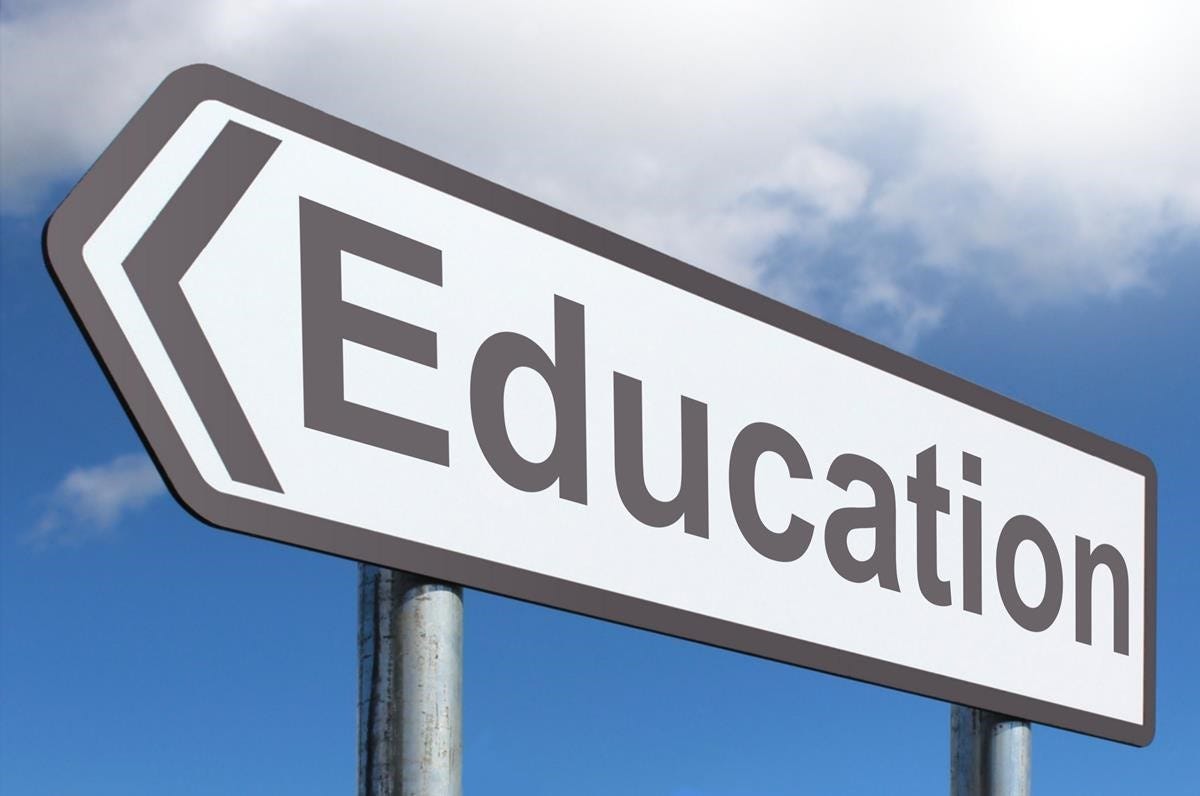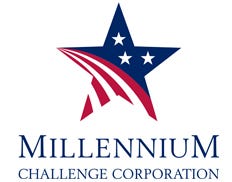(If this message does not format properly in your email - please click the “Read in App / View in Browser” above, top right).
Introduction
In the 19th / 20th Century, if you were to chaperone two young people with a romantic interest in each other you would be “playing gooseberry”. It’s now an almost redundant phrase, superseded by the American phrase to be a “third wheel”. I prefer the fruitier connotations, including the possibilities to be a “gooseberry fool”, which is actually, and unconnectedly, a delicious desert.
The people playing gooseberry in this month’s interview are implementers of education programmes, whether INGOs, NGOs, or private sector contractors. The “romantically” interested parties are a donor and a national government.
But, that’s about as far as this metaphor will stretch, because the implementing agencies are actually employed to provide technical assistance and management services by one of the parties (the donor), while usually working directly with the other party, a national government. This arrangement, where financial power lies with the donor (who controls the funding), and political and administrative power lies with the government, creates tensions from the outset, and can lead to many awkward conversations.
Leading an implementer’s project team in these circumstances is a task requiring considerable diplomacy and sensitivity ; it’s not for the thin-skinned. My interviewee this month, Umarah (a pseudonym), is a very experienced African Team Leader who has worked on major education projects across East, West and Southern Africa working with a variety of donors and governments.
Here, they reflect on the roles implementers play, the relationship challenges they have to navigate, and the circumstances that lead to successful or unsuccessful education programmes.
All names and locations have been anonymised.
Andy Brock, May 2025
"We are like books. Most people only see our cover, the minority read only the introduction, many people believe the critics. Few will know our content." Émile Zola
Subscribe for free and receive each issue of Re Education automatically to your inbox.
Playing Gooseberry : The Implementers' Lot
Andy : Umarah, you’ve had a lot of experience of supporting, leading and managing education projects across Africa. You’ve worked in very senior positions, bridging the relationship between donors and governments. In your view, what makes for a good donor-government-implementer relationship ?
Umarah : Well, I’ll give you three examples : the good, the bad and the indifferent. Starting with the “good” – Aaland. Here, the key was a shared sense of purpose between the government and the donors working in education, not just the donor I worked for. This was particularly evident in the aftermath of a major conflict, where the need to rebuild the education system was clear and urgent. It was helpful that my donor was pretty dominant in the country, so other donors were happy to tag along, because that simplified coordination. This shared purpose persisted even with a change in recipient government, demonstrating the relationship’s strength.
A lot of that was to do with the government’s own strength of purpose. Both the President and the Minister saw eye to eye and the President really trusted the Minister to get on with the job. The minister saw it as a platform for her to make her name – and we were able to help support that. Helping her furthered our (and our donor’s) own agenda.
But, it wasn’t all plain sailing. At one point the Minister fell out with one of our donor’s key staff – they were just young and inexperienced and said the wrong thing. The depth of feeling on the side of the Minister was significant and would surely have jeopardised our working relationship. We played a big role behind the scenes helping to smooth it all over,
In contrast, Beeland was a "bad" example. There was major miscommunication and misalignment of interests between the government and our donor (there were even factions within the donor). Differing interpretations of what a "government-led" programme meant didn’t help. The air was never cleared and we were regularly caught between Beeland government’s sometimes ‘out of scope’ wishes and our donor’s wish to call the shots around what it considered the agreed mandate (except it wasn’t always agreed!).
The whole thing was a toxic situation with nothing written down, no written agreement with government for example, so everyone could take their own interpretation and exploit the uncertainty.
Ceeland was a more “neutral” example. The government was generally supportive, but not actively engaged. The donor trusted our team, so this allowed for greater project autonomy, but, the disengagement of the national government meant less ownership at the national level. So, even while there was good ownership at the local level, the lack of national ownership became more of an issue later in the project when focusing on replicability and sustainability.
Recently, government attitudes have also changed, maybe as a result of renascent nationalism or the increasing frequency of diplomatic fallouts with donor nations. The government is a bit more assertive and is demanding greater say and ownership – which is good, but it can also be bad if it’s the wrong kind of ownership. By that I mean ownership which is deliberately trying to push the project in an unrelated direction, or worse, simply showing authority.
Andy : You mention localisation – this is a major and growing area of discussion. You’re an African who’s worked most of your career for western donors – how do you see the issues ?
Umarah : I think we need a broader definition of localisation beyond just government ownership. It needs to encompass the entire ecosystem of local education stakeholders, including community groups, the private sector, and civil society organisations. Genuine localisation requires interconnectedness and cohesive action across this ecosystem, with the government playing a leadership role that recognises and values the contributions of other actors.
It’s this cohesion, and all actors embracing the need to work together, that builds and nurtures localisation. A common issue is the tendency for a government to be disconnected from the local ecosystem because it equates localisation with government ownership. At its best, localisation strengthens government ownership but entails much more than that – principally, harmonisation of different actors, interests, motivations and levels of power.


Andy : Is there a role then for international implementers in this changing landscape ?
Umarah : Well, one thing is sure, and has been for some time, technical expertise alone is no longer sufficient for success. Implementers must also cultivate "political opportunism" – the ability to identify and capitalise on political windows of opportunity, to effectively navigate the complexities of donor-government relationships. This involves being politically savvy, understanding the nuances of local contexts, building trust, and adapting to changing circumstances.
You know there’s a lot of rhetoric about collaboration, but the reality is that too often competition prevails in the development sector. In Beeland for example, there were constant conflicts between the different donors themselves and with implementers. We were criticised by the donors for being too sympathetic to government and criticised by government for dancing to the donor tune.
We need to find better, stronger mechanisms to incentivise genuine collaboration and ensure that competing interests don't undermine programme effectiveness. The end goal has to be sustainability, especially financial sustainability, and that means involving both Ministries of Education and Finance from a project's inception.
Engaging both ministries early on ensures alignment of goals, facilitates budget integration, and increases the likelihood of government funding continuation after donor support ends. But, this hardly ever happens, not because it’s impossible, but because not enough effort is put in. If it was foregrounded from the onset as a fundamental principle of programme design, this would change. It raises the question of how donors approve business cases, not just with donor countries, but with receiving governments too.
Andy : What other lessons have you learned from your career working in this interface between donors and governments ?
Umarah : The first big lesson is around policy reform. You know, policy reform is an inherently lengthy process, not a quick fix. In Ceeland it took more than ten years to develop a particular policy that then became a guiding framework owned and disseminated by the government itself. How many donors have that level of patience and commitment ? But, more than that, although this seems long and frustrating, that extended time allowed for thorough experimentation and refinement, for building grassroots and political momentum – ultimately, it led to a more robust and effective policy.
The second lesson is the importance of early wins. Projects really need to prioritise achieving "quick wins" from the outset rather than waiting until midway through implementation. Early successes build trust, demonstrate value to both the government and donors, and create momentum for continued engagement and support. Too often implementers are focused on getting systems established, forming relationships, managing staff. That’s all important, but it’s critical to build up momentum – the sense of moving forward gives everyone confidence.
The third lesson is around adaptive programming. For adaptive programming to be truly effective, it must be supported by robust, multi-year planning capacity within government systems – a rare beast. But, when you have that kind of planning it ensures that adjustments made during implementation can be adequately reflected in government budgets and plans, making transitions smooth and enabling long-term sustainability. If you don’t have that, adaptive programming is limited to finite project cycles.
Andy : I want to finish by asking what your thoughts are about the future for education development in Africa – what trends do you see ?
Umarah : I’d highlight a couple of areas – first, the devastating impact of climate change, conflict, and poverty on education systems across sub-Saharan Africa, These external factors can overshadow the internal challenges within these education systems. They contribute significantly to the learning crisis, which is why we need to see interventions that address both systemic issues and these broader societal challenges.
Secondly, the crisis in funding means we are seeing newer actors appear on the scene, such as philanthropic foundations and outcome-based funding agencies. They have the potential to reshape the traditional donor landscape. But, less observed is the increasing influence of regional bodies, like the African Union, which, coupled with China’s growing presence in the development sphere, suggests a potential shift in power dynamics within the sector, not just from localisation but from geopolitical realignments.
Finally, I hope we are moving to a position where relationships between governments and donors are based on trust, transparency and shared purpose from the very start. Programme purpose, scope and parameters must be clear and agreed by these two ‘lovers’ before mobilising an implementer to provide technical assistance services. This would make playing gooseberry (or being a gooseberry fool !), truly a thing of the past. It would also avoid the waste of time and resources inherent in that chaperone role, replacing it with genuinely collaborative partnerships focused on the task at hand.
News
The pain continues : the Millennium Challenge Corporation is to be shut down.
In, possibly, better news, the World Bank is joining with IFFEd to accelerate education financing. The IFFEd website has a 2m explainer video which makes some pretty big claims that I will look at in a future issue e.g. for every $1 raised IFFEd can multiply that 7 times.
A new report “Impact of USAID Withdrawal on Global Education and Skills Development” funded by the European Training Foundation (ETF). Has some comprehensive and useful analysis of which countries and sub-sectors will be most impacted. The conclusion makes recommendations including how :
..the EU can mobilise resources to mitigate the worst impacts while amplifying its global leadership role in education development.
We’ll see.
A friend from a major research university in the US has shared this unofficial guidance from the National Institutes of Health (NIH) which explains that use of these words in grant proposals may result in automatic rejection…Surprised “free speech” isn’t in there !
Development
According to a post by Mackenzie Price there’s now an “arms race” in AI between the US and China. Her post seems rather uncritical, seeing only opportunities. Pouring cold water on this view see this article from Dr. Shannon Doak that articulates nicely some of the key concerns. Here’s an excerpt that should resonate in education practice in the global south too (see Issue #14).
The crux of the issue lies in our application of technology. For over a century, educational practices have remained largely unchanged, focusing on passive absorption of information and standardized testing. The introduction of technology, including AI, has often been limited to digitizing these existing practices rather than reimagining them. As a result, the transformative power of technology has not been fully realized in enhancing student learning.
Claire Zau writes a very useful Substack called AI & Education. It’s an easily digestible round-up and always has helpful links.
Stefan Dercon has published a two-part blog on the What Works Hub website addressing the relationship between researchers and policymakers and asking : “Why do policymakers choose education reforms that aren’t supported by evidence?”. It’s a good read and addresses some thorny issues about the politics of education change and reform. But, surprisingly, Dercon does not refer to the organisations who have been at the centre of this work for decades – education consultancies, INGOs and NGOs (declaring my interest, I worked for such an education consultancy for decades). He seems to see only researchers and decision-makers, though he refers, cryptically, to “mercenaries” several times.
He cites Tusome in Kenya as one of the examples of a successful, at scale programme. That programme was “managed” for USAID by RTI, then one of the biggest education contractors in the US. The role of “contractor” organisations has always been to navigate this complex political territory and bring together both practitioners and researchers to try to help support Ministries of Education in their change programmes (as the guest interview above demonstrates).
The Global Public Investment Secretariat has launched a report called The Birth of Global Public Investment. Jonathan Glennie, who wrote “The Future of Aid” is the key author. As I suggested in my piece on how this might affect or be impacted by the education sector (Issue # 11 on Broken Aid) GPE is highlighted as one institution within the education space that could start to reform in this direction.
A very popular post from A Suleiman on the relevance of RCTs in education – an old debate, but one that needs regular airing. Exemplar quote :
RCTs reward what is small, measurable and politically safe. They celebrate modest statistical gains while ignoring the systems that produce the problem in the first place.
Voices from the front
Save the Children’s Shaima Al-Obaidi writing in The Guardian, reminding us of this unconscionable terror visited on children in Gaza.
The 100&change competition, launched by the MacArthur Foundation and managed by Lever for Change, offers a $100M grant to help solve one of the world's most critical social challenges. The Teaching at the Right Level (TaRL) approach is one of five finalist solutions in this year’s competition.
Tambua Utu is a Tanzanian organisation advocating for the rights of people with disabilities (PWD’s). They are raising funds to support PWDs through education, rehabilitation care, assistive devices/aid, psychosocial support and economic empowerment training for girls and women with disabilities. See here for their work.
Voices from the rear
(Gray and Published Research)
More evidence, were it needed, that investment in early learning programmes pays off handsomely and reduces inequity. A research study in South Africa reviewed the progress of 551 children enrolled in SmartStart early learning programmes (ELPs) over an intensive eight-month period. The proportion of children deemed “on track,” rose from 45% to 65% and children "falling far behind" nearly halved. Significantly, the study found a marked reduction in the achievement gap between children from low- and high-income households, narrowing from 25 to just 6 points.
Angella Kasule Nabwowe & Jo Becker in the Uganda Observer make the case for providing one year of free pre-primary education, citing three recent reports supportive of investment in pre-primary. But, they find the annual fees for one child at a private nursery can be several months’ average salary,
Making it a triple… reinforcing the growing calls for more focus on early years education was a CGD event on financing early childhood development which highlighted the growing support of development banks, civil society and governments to invest in early years.
UKFIET’s latest newsletter contains some great articles focused on the theme of disability in education. It also includes a thought-provoking piece by Dr Bukola Oyinloye looking at “invisibility in education and development research” highlighting the low numbers of global south, and especially African researchers, with high profiles and influence.
And finally
I’ve been listening to an excellent podcast from Your Undivided Attention called “The Man Who Predicted the Downfall of Thinking” (episode 105) about the well-known writer and academic, Neil Postman. One of his most famous quotes - one very apposite for these times - referring to George Orwell’s dystopian novel “1984” and Aldous Huxley’s futuristic “Brave New World” says :
(In 1984)…people are controlled by inflicting pain. In Brave New World, they are controlled by inflicting pleasure. In short, Orwell feared that what we hate will ruin us. Huxley feared that what we love will ruin us"
This image, from the BBC, seems to encapsulate the latter.
If you know someone who would be interested in reading this newsletter, please pass on, by clicking the share button below. Subscription is free - subscribers receive each issue of Re Education automatically.










